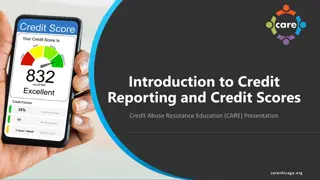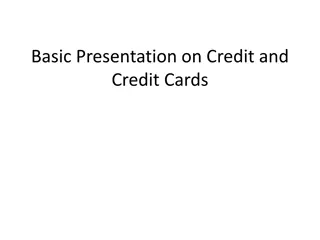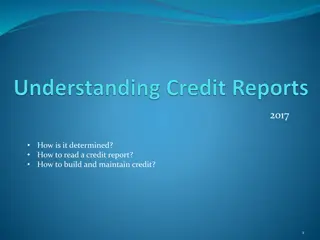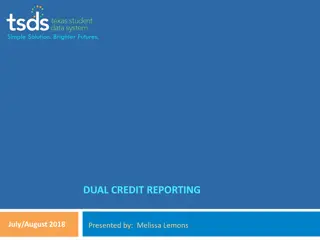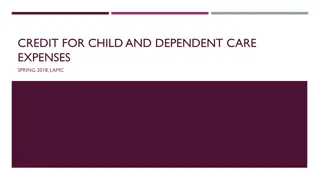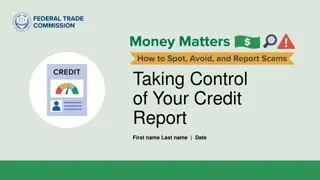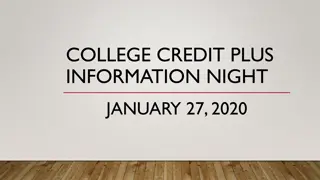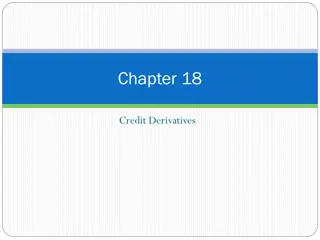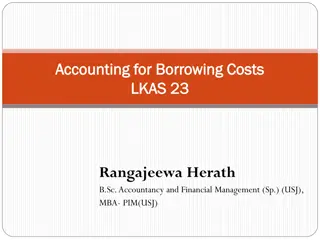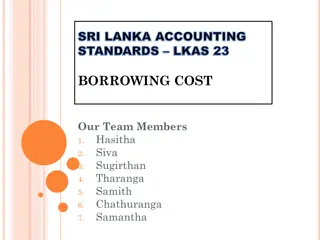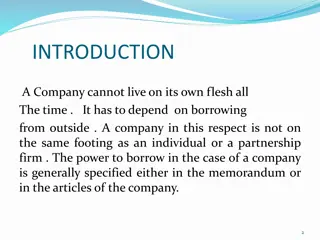Understanding Borrowing and Credit: Key Concepts and Considerations
Explore the world of borrowing and credit, including types of borrowing, terminology, reasons for borrowing, alternatives, benefits, factors to consider, risks, and ways to mitigate them. Activities highlight real-world examples and offer insights on responsible borrowing decisions.
Download Presentation

Please find below an Image/Link to download the presentation.
The content on the website is provided AS IS for your information and personal use only. It may not be sold, licensed, or shared on other websites without obtaining consent from the author. Download presentation by click this link. If you encounter any issues during the download, it is possible that the publisher has removed the file from their server.
E N D
Presentation Transcript
Lets talk about money Borrowing Money Exploring borrowing and credit This material is intended for information purposes only and does not constitute advice or a recommendation.
Introduction Today you will be learning about: Types of borrowing and credit. Borrowing terminology. Why you might borrow money. The alternatives to borrowing. The benefits of borrowing. Factors to consider when choosing products. Risks of borrowing, and ways to avoid those risks.
Activity A Borrowers in the UK paid 142 milliona day in interest on average, based on December 2022 trends. 142 MILLION Why borrow At the end of October 2022, the average credit card debt for an adult in the UK was 1,184. DEBT TRUE OR FALSE A credit card on the average interest rate would take 25 years and 8 months to repay if you only paid the legal minimum repayments (interest plus 1% of the outstanding balance) each month. The current average total debt per household, including mortgages was 65,746. According to the office for budget responsibility s March 2022 forecast, the average will increase to 85,906 by 2025. Source: The Money Charity
Activity A Why borrow? Why might people want to borrow money ?
Activity A round up Why borrow? Key learning: It is important to understand why you may want to borrow. Sometimes, it might be better to find another way, for example, to save money first. You should be clear about your reasons for borrowing. Always think about whether your borrowing is manageable and if you can afford to pay it back. Having debt can impact your mental health.
Activity B round up Understanding borrowing Key learning: It is important to know the types of borrowing for each situation that may arise at different stages of your life. It is important to know where to get advice and not to be afraid to ask. There are many reputable money advice services and websites that can provide guidance to help you with borrowing decisions. It is important to keep safe and to understand the risks when borrowing or using credit.
Activity C Borrowing decisions Ethan s friends have asked him to go on holiday to Ibiza. He can t afford it and still owes his Dad money from his holiday last year. He s just opened a new credit card account, and so he says yes and buys his flight on the card. Six months later, he s struggling to make even the minimum payment each month. Ethan Why did he borrow? What kind of borrowing was it? Was it a good or bad decision? What could he have done? What should he do now?
Activity C Borrowing decisions Jasmine as just got her first job and wants to move out of her parent's home but renting is expensive. She has some savings and has applied for a loan that helps younger buyers purchase their first home. The payments are fixed for five years so she knows how much she will pay each month. She wants to travel in the future, and if she owns her home, then she may be able to rent it out when she is away. She needs to do more research into this. Jasmine Why did Jasmine borrow? What kind of borrowing was it? Was it a good or bad decision? What could she do differently?
Activity C Borrowing decisions Rob just got his first job - he doesn't earn a lot. He applied for a credit card, but was rejected. He went clothes shopping and was offered 10% off his purchase if he signed up for a store card. In the same day, he signed up for two. Three months later, he has spent all of the credit available to him. The interest payments are really high, and he s worried as he doesn't know how he is going to pay off the debts. Rob Why did Rob borrow? What kind of borrowing was it? Was it a good borrowing decision? How it is affecting him? What should he do now? What could he have done to avoid it?
Activity C Borrowing decisions Malik is studying at university. He has taken out a loan to pay for his fees. He didn t want to borrow any more, so he has decided to live at home with his parents. He works part time and hopes that by the time he finishes university, he will only have his fees to repay. He doesn t have to repay the loan until he starts earning a set amount in a job, so he may take a gap year first. Malik Why did Malik borrow? What kind of borrowing was it? Was it a good decision? Could he have done anything differently?
Activity C Round up Borrowing decisions Key learning: It is important to understand our motivations for borrowing. Always ask yourself if you can afford it and if you need it? We should consider alternatives first, such as saving. It is important to know where to go for advice when making borrowing decisions. Borrowing can help us to manage our finances. It is also important to ask for advice if we run into problems with borrowing. We need to understand the risks that can come with borrowing, and that there could be a negative impact our credit score and credit history if we cannot afford to pay back borrowed money.






